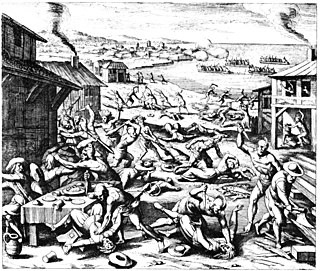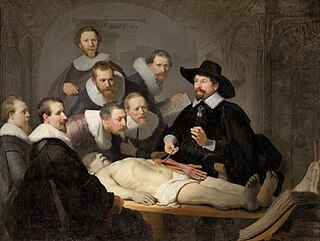Related Research Articles
1703 (MDCCIII) was a common year starting on Monday of the Gregorian calendar and a common year starting on Friday of the Julian calendar, the 1703rd year of the Common Era (CE) and Anno Domini (AD) designations, the 703rd year of the 2nd millennium, the 3rd year of the 18th century, and the 4th year of the 1700s decade. As of the start of 1703, the Gregorian calendar was 11 days ahead of the Julian calendar, which remained in localized use until 1923.

The 1620s decade ran from January 1, 1620, to December 31, 1629.

1632 (MDCXXXII) was a leap year starting on Thursday of the Gregorian calendar and a leap year starting on Sunday of the Julian calendar, the 1632nd year of the Common Era (CE) and Anno Domini (AD) designations, the 632nd year of the 2nd millennium, the 32nd year of the 17th century, and the 3rd year of the 1630s decade. As of the start of 1632, the Gregorian calendar was 10 days ahead of the Julian calendar, which remained in localized use until 1923.

1628 (MDCXXVIII) was a leap year starting on Saturday of the Gregorian calendar and a leap year starting on Tuesday of the Julian calendar, the 1628th year of the Common Era (CE) and Anno Domini (AD) designations, the 628th year of the 2nd millennium, the 28th year of the 17th century, and the 9th year of the 1620s decade. As of the start of 1628, the Gregorian calendar was 10 days ahead of the Julian calendar, which remained in localized use until 1923.

1592 (MDXCII) was a leap year starting on Wednesday of the Gregorian calendar and a leap year starting on Saturday of the Julian calendar, the 1592nd year of the Common Era (CE) and Anno Domini (AD) designations, the 592nd year of the 2nd millennium, the 92nd year of the 16th century, and the 3rd year of the 1590s decade. As of the start of 1592, the Gregorian calendar was 10 days ahead of the Julian calendar, which remained in localized use until 1923.

1784 (MDCCLXXXIV) was a leap year starting on Thursday of the Gregorian calendar and a leap year starting on Monday of the Julian calendar, the 1784th year of the Common Era (CE) and Anno Domini (AD) designations, the 784th year of the 2nd millennium, the 84th year of the 18th century, and the 5th year of the 1780s decade. As of the start of 1784, the Gregorian calendar was 11 days ahead of the Julian calendar, which remained in localized use until 1923.

George Villiers, 1st Duke of Buckingham, KG, was an English courtier, statesman, and patron of the arts. He was a favourite and self-described "lover" of King James VI and I. Buckingham remained at the height of royal favour for the first three years of the reign of James's son, Charles I, until he was assassinated.
This article contains information about the literary events and publications of 1674.
This article presents lists of the literary events and publications in 1661.
This article contains information about the literary events and publications of 1632.
This article contains information about the literary events and publications of 1630.
Events from the year 1621 in literature.
This article contains information about the literary events and publications of 1608.
This article contains information about the literary events and publications of 1601.
Duke of Buckingham, referring to Buckingham, is an extinct title that has been created several times in the peerages of England, Great Britain, and the United Kingdom. There were creations of double dukedoms of Buckingham and Normanby and of Buckingham and Chandos. The last holder of the dukedom died in 1889.
There has been a Lord Lieutenant of Buckinghamshire almost continuously since the position was created by King Henry VIII in 1535. The only exception to this was the English Civil War and English Interregnum between 1643 and 1660 when there was no king to support the Lieutenancy. The following list consists of all known holders of the position: earlier records have been lost and so a complete list is not possible. Since 1702, all Lord Lieutenants have also been Custos Rotulorum of Buckinghamshire.
Nationality words link to articles with information on the nation's poetry or literature.

John Clavell was a highwayman, writer, lawyer, and medical doctor. He is known for his poem A Recantation of an Ill Led Life, and his play The Soddered Citizen. His life is mainly split into two parts: his early life in England, where he grew up, lived as a highwayman, and started his reformation, and the latter part of his life in England and Ireland where he was a lawyer and physician.

Nationality words link to articles with information on the nation's poetry or literature.
Events from the year 1628 in France
References
- ↑ An Inventory of the Historical Monuments in the City of Cambridge. H.M. Stationery Office. 1959. p. 232.
- ↑ Pafford, John, ed. John Clavell, 1601-43: Highwayman, Author, Lawyer and Doctor—with a reprint Of his poem, A Recantation of an Ill Led Life, 1634. Oxford: Leopard’s Head PL, 1993: 48
- ↑ Thomas Dekker (1620). Old Fortunatus: a play. J.M. Dent. p. 10.
- ↑ "François de Malherbe | French poet | Britannica". www.britannica.com. Retrieved 4 June 2022.